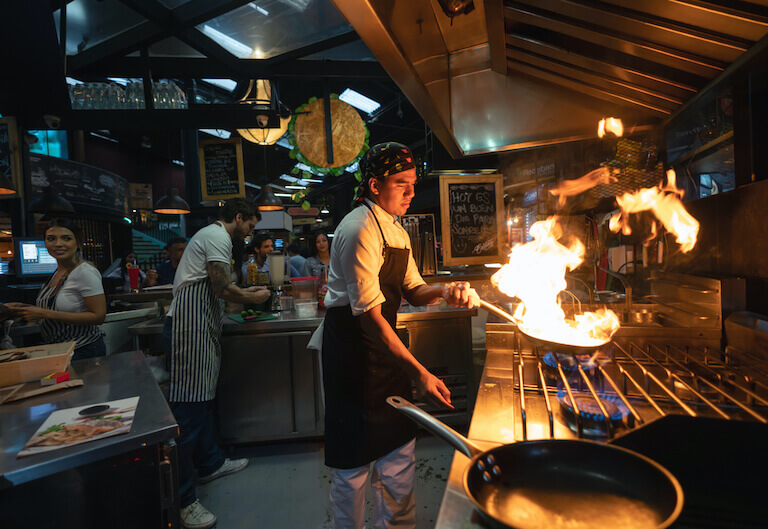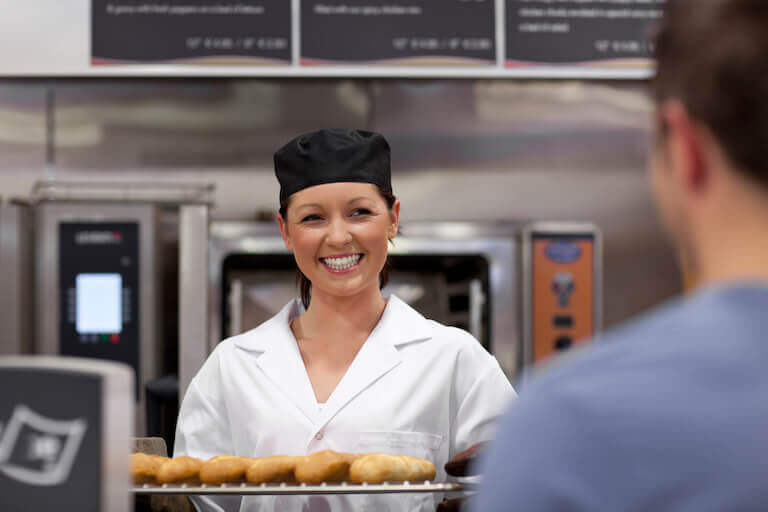While exploring new culinary techniques and practicing your skills in a school kitchen may make you a better cook, there’s no replacing working in a commercial kitchen. That’s why culinary internships and externships are such an important part of culinary school.
Internships and externships are both types of experiential learning opportunities, but they differ in a few key ways. For one, internships typically last longer. These are more general positions that can allow students to practice important culinary skills and get comfortable in a professional kitchen.
Externships, on the other hand, are shorter in length and niche-specific. These can allow students to build skills they need for their desired career and focus on the type of cooking they’d like to do after graduating. Both can open students to opportunities they wouldn’t have in classes alone and allow them to practice working in operational kitchens.
Hands-on industry externships are a requirement for students to graduate from any program at Auguste Escoffier School of Culinary Arts. Let’s dive into how the internship and externship experience can enrich your career and give you the confidence and understanding you need to pursue your dreams.
Hands-On Experience With Guidance and Feedback
In your culinary classes, your Chef Instructors can be there to teach, guide, and encourage you in a controlled classroom environment. However, opportunities to practice and apply these skills in real kitchens are essential to becoming the best chef you can be.

Externships can provide you with opportunities to develop your craft under the direction of veteran culinarians. These professionals can give you feedback that can make you a stronger cook, and they may be able to help you develop new skills. They can provide experience using commercial equipment, scaling recipes, and managing competing demands in the kitchen. Escoffier Pastry Arts graduate Kjersti Walker, for example, was able to practice her piping during her externship with Biltmore Estate in North Carolina.
“Honing in on the skills [in an externship] is so important. I was able to hone in on my piping … I was able to play with that and delve into [it] and make different desserts.”*
Kjersti Walker, Escoffier Pastry Arts Graduate
Before beginning her externship, Walker knew that she had a strong grasp of flavor, but that her piping skills and technique could use improvement. After several weeks at this establishment and plenty of practice, she walked away with improved cake decorating skills.
This hands-on experience can potentially translate to better job prospects, too. When hiring new chefs or cooks, restaurants tend to fill positions with the most experienced candidates. They want to know that you have what it takes to keep up in fast-paced and fluid kitchens. The more time you spend in professional kitchens before graduating, the more prepared you may be to blend seamlessly into a new kitchen after graduating.
A day in the life of an Escoffier extern.
What Can You Learn From an Externship?
What exactly you learn from an industry externship is up to you. You may target any of the following subsets of skills in your placement and more:
- Presentation and plating
- Technique
- Ingredient sourcing
- Recipe development
- Kitchen and business management
- Use of global flavors
- Improvement of guest experiences
Once you decide what you’d like to specialize as a cook, you can find a food service operation where you’d like to extern that can give you room to exercise and expand your talents within this specialty. Every externship is different—there is no one-size-fits-all—just as there is no single type of chef.
As a student, you can have the opportunity to find your own externships that align with your career goals. The Escoffier culinary school curriculum is designed to help you start thinking about these goals early on, so that you are prepared to pursue them when the time comes. But if you’re not yet sure what type of job you’d like after graduation, you can explore your options through varied externships.

Opportunities to Explore Your Interests
As mentioned, some cooks know exactly what they want to do before they even enter culinary school, but many others need time to choose a path for themselves. Culinary internships and externships can help you gain a sense of direction and purpose.
Externships are great for exploring different interests because they are often shorter than internships and more specific. They can help students visualize what they may want and try on many different hats until they find a good fit.
But don’t think you have to wait until graduation to experience working in a top restaurant! Culinary Arts graduate Parker Wilks-Bryant worked hard to secure an externship at Pujol, one of the top 50 restaurants in the world. This not only gave him experience working with talented chefs, but it also showed him what it takes to produce this level of food.
“That stove top range that they use in the back kitchen–there are two kitchens at Pujol–it’s just constantly going sauce prep there. It’s pretty heavy,” says Wilks-Bryant. “The workdays there can be up to 16–18 hours a day. Those burners are constantly going, and it’s hot back there. It’s very hot.”*
Even if you think you have a good idea of where you want your culinary career to take you, you may change your mind after shadowing different kitchens and testing out several different options. Who knows what a great externship may inspire you to do?

Chances to Network With Other Professionals
You might not think that networking is important for chefs, but that couldn’t be further from the truth. In reality, chefs need to network with other professionals in order to keep refining their skills as well as learn about new opportunities.
Escoffier can help pair you with capable mentors during your time with the institute, but there’s no reason you can’t look to other professionals for mentorship. You may meet a chef in one of your externships that you really admire, and you can—and should—ask them as many questions as you can on your path to becoming a better chef.
Sometimes, networking with the right people can help you land the job of your dreams. By being proactive about not only seeking out excellent positions, but also about making your time in those positions worthwhile, you can potentially build a career. Build relationships with people you meet in your various professional experiences and keep in touch with them, practice the skills you explored in the classroom, and don’t hesitate to inquire about a longer-term position.
Build a Resume to Launch Your Career
Every restaurant you have the chance to work in as a culinary student may have an impact on your career. Since every kitchen and the people in it are different, each place can teach you something new.
As a chef, your resume starts when you’re in school, and a culinary externship can give you a robust skillset as well as show that you have experience working in a busy kitchen. This may make you an appealing candidate to hiring managers, who look for cooks and culinarians that are flexible and quick on their feet.
It’s also important to be able to name what you’ve learned from your hands-on experiences on your resume, as this will help employers to see how your craft has grown and developed. Rather than simply listing you spent time working at a restaurant, you can highlight how you advanced your plating skills, learned to work with a certain cuisine, or created a certain number of salads each night.
Think of culinary externships as extensions of your career. If you know that you want to work in a kitchen that specializes in cutting-edge tasting menus, give your career a head start by choosing an externship at a restaurant that strictly serves tasting menus.
Or if you’re planning to become a vegan chef and want to cook inventive vegan dishes that put the spotlight on great produce, an externship that gives you experience sourcing fresh and high-quality ingredients, coordinating with farmers, and studying ways to cook more sustainably belongs on your resume.
Finding the Right Externship For You
All Escoffier students must secure and complete externships before graduating. And although you have a lot of say in what these will look like for you, you’re not alone in selecting them. Escoffier Career Services staff is committed to helping every student find shadowing positions, whether they attend the school in-person or online.
If you aren’t sure where to complete an externship, your mentors and Chef Instructors can also provide guidance. They may have a good understanding of where you excel and what you still need to practice, as well as what skills restaurants and employers look for in culinary school graduates.
When you’re ready to commit to a culinary education, and all of the valuable experiences that come with it, reach out to our team to get started with your application.
Here are a few more articles on the importance of a well-rounded culinary education:
- Is a Culinary Diploma or Degree Worth It?
- Culinary School Versus “Work Your Way Up:” The Case for Education
- What Can You Learn in Culinary School?
*This information may not reflect every student’s experience. Results and outcomes may be based on several factors such as geographical region or previous experience.
This article was originally published on April 19, 2021, and has since been updated.

